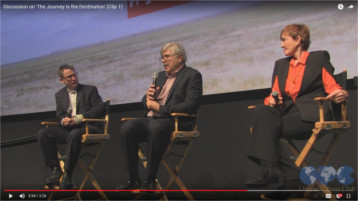Event Coverage Highlight

Dan Eldon Biopic Offers Key Lessons on Inspiration and Risk
By Chad Bouchard
A feature film celebrating the life of photojournalist Dan Eldon and shining light on his tragic death in 1993 also serves as a sobering reminder of persistent threats against journalists today. That was a key takeaway from the Q&A following a special screening of The Journey is the Destination on Oct. 30.
The film’s New York premiere, co-sponsored by the OPC, Creative Visions and Extraordinary Journeys Inc, was an emotionally charged gathering for many who knew Dan or his family personally.
Dan was killed by an angry mob in Mogadishu while he and other journalists were covering the aftermath of a United Nations bombing raid against a clan leader. Eldon and three of his colleagues were beaten to death.
Before his death Dan, who was the youngest photo journalist ever to work on the frontlines for Reuters, had embarked with a group of friends on an epic aid mission and road trip across Africa. Much of the film centers on this journey as well as his romantic struggle along the way.
After the screening, Kathy Eldon, Dan’s mother and the film’s producer as well as the founder of Creative Visions, made an appeal to attendees to use the film and Dan’s story as a springboard for change.
“I look at you people, and I think about how you are the ones, you are the power of media, you are the power of storytelling, the ones who can guide us to the light,” she said. “You can choose stories that are solutions-oriented. You can choose heroes that are positive figures. You can tell us things that will make us believe that there is the possibility of light somewhere out there at the end of this tortuous tunnel.”
The Q&A included OPC member John Daniszewski, who serves as editor-at-large for standards for The Associated Press. He directed AP news coverage of 11 countries in southern Africa when Dan Eldon was there, and his friend Hansi Krauss was killed in the same incident as Dan.
Daniszewski said there had been a slow shift in the culture of journalism since Dan’s death, in part spurred by the incident in Mogadishu as well as other violent deaths of journalists in Bosnia in the early 90s, toward improving safety and reducing risk in reporting on conflict.
“It’s much more safety oriented now, for better or worse,” he said. “News organizations tend to invest a lot more trying to protect journalists, and there’s also a movement afoot to create safer conditions for freelancers who often don’t have the financial resources for things like hostile environment training and armored cars and insurance for them.”
Also speaking at the Q&A was Dan Thomas, special adviser for advocacy and communications at UNICEF, who worked at the Reuters Bureau in Nairobi in the 90’s. Thomas underscored the importance of showing audiences the real threats that journalist face, and not romanticizing the role of conflict reporters.
“I feel that so many of these films about journalism are a bit hokey and a bit Hollywood-y, this is to my mind was a very realistic portrayal of what the trade is,” he said.
Kathy Eldon added that journalists also face other more recent threats, such as being discredited and falsely accused of being “fake news.”
Daniszewski said there needs to be a change in consumer attitudes about journalism and what it’s worth to readers. “Independent journalism needs to be supported,” he said. “If you value the information, if you value the reporting that we do, then you need to support that by contributing, by paying for it, in the internet age, increasingly people are going to have to pay for what they value.”
Watch clips from the Q&A in the window below.

